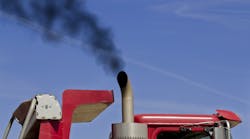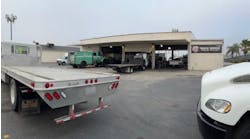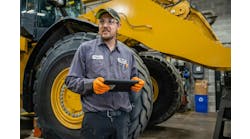It’s no secret that proper diesel particulate filter (DPF) maintenance is critical to fleets being able to keep their vehicles on the road.
Having a strong understanding of proper DPF cleaning practices and developing an effective and proven preventive maintenance strategy will allow fleets to not only avoid unplanned and costly breakdowns, but achieve better fuel economy and extend the overall life of their vehicles.
“If fleets are not paying attention to how often their regenerations are occurring and doing preventive maintenance on DPF, they will end up with unplanned breakdowns, often with a load, and costs multiply quickly,” says Jamin Woody, service manager, Motor Trucks International and Idealease (www.idealease.com), a provider of truck leasing, truck rental and dedicated maintenance solutions.
MAINTENANCE REQUIRED
In 2007, the U.S. Environmental Protection Agency mandated that all new on-highway diesel engines must limit the emission of particulate matter. In response, vehicle OEMs developed and incorporated DPFs as part of a comprehensive emissions control system.
DPFs collect diesel particulates in a diesel engine’s exhaust through a complex filtering process. Particulate matter gathered through this process is promptly oxidized to remove it from the DPF.
DPF technology requires proper maintenance to ensure the filters adequately perform their role as a means of reducing emissions, improving fuel economy and helping trucks run quieter.
When diesel particulate in the exhaust stream continually builds up in the DPF, it restricts system flow and creates significant back pressure. This leads to a number of issues, including:
- Plugged DPF.
- Low vehicle power.
- Engine derate.
- Cracked DPF.
- Melted filters.
- Engine damage.
According to Idealease’s Woody, the most common result of improper maintenance is replacement of the DPF.
“The longer that filter is in use without proper cleaning, the more likely it is to need to be replaced when it does come off,” he says. “We have seen a direct correlation to extended service intervals and higher replacement percentages in our shop.”
POTENTIAL PROBLEMS
When issues such as excessive regenerations, catalyst face plugging and premature filter restriction occur, a problem upstream in the vehicle – often an engine condition – is to blame.
“Understand the DPF is just a filter; it’s the symptomatic part of an entire system,” says Idealease’s Woody. “It did not plug up on its own. Something else is the cause. If you have a driver complaining of frequent regens, investigate the cause. Don’t just clean the filter.”
Symptoms that suggest a problem with the DPF include:
- Warning lights.
- Loss in fuel efficiency.
- Loss of coolant.
- Exhaust blow-by.
- Loss in power.
- Lower turbo boost.
STAY ON TOP OF THINGS
According to officials at Diesel Emissions Service (www.dieselemissionsservice.com), a distributor of DPFs, all DPFs are equipped with a warning system to alert vehicle operators of required maintenance intervals. Drivers and fleet maintenance professionals must heed these warning systems and perform necessary DPF maintenance in a timely fashion. In addition, using the right equipment and conducting proper procedures during the required maintenance is critical to avoiding damage of the DPF.
A clean, properly-functioning diesel particulate filter decreases the amount of energy required to move a vehicle, and that means less fuel is necessary as well. If it is maintained well, a DPF also will regenerate far less often than one that is unclean and “plugged up,” says Idealease’s Woody.
“And regens burn additional fuel,” he continues. “Drivers that pay attention can tell when their truck is regenerating more often and prevent downtime by knowing and pointing out that something is wrong. Emissions system downtime for preventive maintenance can be under a shift, but for a repair, it can be a week or more depending on what is wrong and where parts are. Plus, preventive maintenance is significantly cheaper than repair.”
When a DPF is plugged with soot or ash, the vehicle’s engine also generates more heat, performs less effectively and, eventually, breaks down. Proper maintenance, though, helps prevent wear and tear on the engine, which, naturally, leads to better vehicle efficiency.
“Suffice it to say that the less back pressure there is, the better the fuel economy,” says Kirk Altrichter, vice president, maintenance, Crete Carrier Corporation (www.cretecarrier.com), a privately-owned trucking company.
PURCHASE CONSIDERATIONS
A quality DPF cleaning system is one of the most effective tools to help fleets keep their filters from getting dirty and plugged up and, therefore, keeping their vehicles on the road. The importance of making an informed purchasing decision about what, if any, cleaning system to buy cannot be overstated.
“Talk to other fleets and users of the cleaning equipment,” says Altrichter of Crete Carrier. “Talk to the engine OEMs to determine their stance on DPF cleaning. Understand the costs of each scenario and spend the time in your own fleet determining what works for you on the interval.”
According to Idealease’s Woody, putting in the requisite time and effort to find what works best for the fleet is key to making the right decision.
“The worst thing you could do is install a filter you think is clean only to find out through 20 hours of troubleshooting everything else that your machine did not truly get it clean,” he says.
Woody suggests visiting a maintenance facility that employs a DPF cleaning machine, watching the cleaning process and making sure the system is able to provide proper cleanliness.
“If you can’t afford to buy a machine that works, then pay somebody to clean your filters,” he adds.
Accurately determining the total cost of ownership of a DPF cleaning system, as opposed to just identifying its initial purchase price, can go a long way toward helping ensure a fleet makes a quality investment.
“It must clean DPFs completely in a reasonable time and accurately measure ‘before’ and ‘after’ conditions,” says Bob Phipps, maintenance supervisor, Bettendorf Trucking (www.bettendorftrucking.com), a diversified commodity trucking company. “Ash and soot are as hard on a cleaner as they are on an engine, so strong design, good fit, easy maintenance and top quality are mandatory,” he adds.
That’s why it’s so vital to know the cleaning system supplier’s history, business reputation and long-term plans.
“In addition to the machine, you are also buying parts support, technical guidance and ‘best practice’ experience with filters, ash disposal and environmental compliance,” says Phipps. “Do your homework, because you get what you pay for.”




